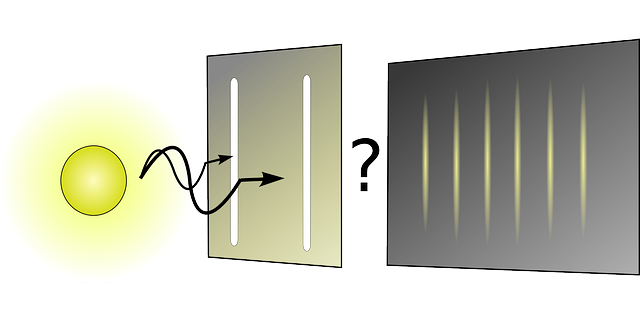Quantum computers have the potential to change our society significantly.
What started over 30 years ago as a visionary but hopeless legacy of a brilliant physicist is now starting to become reality .
The goal of my free online book “quantum computer explained“ is to provide comprehensive and up-to-date information about the enigmatic technology. All you need to bring with you is a good dose of curiosity .
Quantum computers: An information vacuum

The term “quantum computer” appears regularly in the technology news of the mainstream media. In my opinion, the isolated and vague reports that you will find there cannot provide a satisfactory picture. But how should they? The topic is far too difficult and too complex for this: in order to grasp the quantum computers to some extent, one has to look far behind the scenes of the usual explanations about the quantum world and computer science.
There is a multitude of complicated, very mathematical teaching materials from universities to quantum computers. You can follow current developments in quantum computer research only in much more sophisticated scientific articles. This requires an enormous amount of prior knowledge in quantum mechanics and mathematics.
But how should a broader public get a clear picture of the way it works, the level of development and the possibilities of the new technology that are said to be almost magical? Is it even possible to convey the topic well to laymen interested in technology? How can you differentiate between the hype and the real opportunities behind it? Are the grants, which are by now substantial, somehow justified?
For some decision-makers and in the technology sector in particular, the time will come at some point in the next few years when they will have to decide whether their company should invest in the new “quantum computer” technology. Computer scientists and IT professionals have to consider for themselves whether they should start the difficult path to acquire know-how in the new area ”quantum computers”. An area that is so completely different from anything else in computer science.
Quantum-computer-explained is aimed to fill this information vacuum with life. On the next few pages I will give you a fairly precise understanding of quantum computers. I will explain the basics and also deal specifically with topics from the current development and research.
Yet I will almost completely avoid mathematics and describe the essence behind quantum computers rather visually. Instead of being exact, I will focus on a very good, qualitative understanding. Therefore, this website should also be a good starting point to get into the extremely complicated matter and without loosing the big picture.
You won’t find a second website about quantum computers like it.
… at least I think so. ![]()
In particular, I will answer the following questions in more detail:
-
-
- What exactly is a quantum computer?
- How does a quantum computer work?
- What is quantum supremacy?
- Why this hype about quantum computers anyway?
- Which quantum computers already exist and which will be there soon?
- What are the foreseeable areas of application for quantum computers?
- What exactly is a “qubit”?
- How do quantum programs actually look like?
-
I will keep the answers to these questions up to date and regularly respond to new developments. “Quantum computer explained” is the English version of my German website “quantencomputer-info.de”, which I started after the great feedback I received.
Quantum-Computers-Explained.com: An online book

On the one hand, my website is intended to be an online book, that you may read from start to end. It now includes over 100 A4 pages and well over 150 references to scientific articles and lectures that I have collected over the years (thanks to arxiv.org, Youtube, Wikipedea and Co, even freely accessible online).
If you prefer to read individual articles, which of course works well, I still recommend my extensive introduction “The incredible quantum computer simply explained” . Really, you should read it:
Even if you have already learned some basic things about quantum computers, you have probably never seen a real picture about quantum entanglement. You also may not have been able to get an idea of how a quantum computer program really looks like … let alone how you can easily try one out online yourself. I will also explain in a simple and very visual way how a well-known search algorithm for quantum computers (the “Grover algorithm”) works.
And whatever you should also read …
Oh forget it. If I think about it, you should probably just read everything.
But I have to warn you. Quantum mechanics and thus the quantum computers are fascinatingly comparable with nothing that you have dealt with so far. A certain amount of effort and a lot of curiosity are required to grasp them … What I want to say is best expressed by „Morpheus“ in the science fiction classic “The Matrix”:
“This is your last chance. After that there is no going back. Take the blue pill – the story ends … take the red pill – you stay here in wonderland and I will show you how deep the rabbit hole goes. ”
![]()
The “Age of Quantum Computers”
Quantum computers are likely to gradually open the door to a new world. This world will be so bizarre and different that research is only slowly getting an idea of what will be possible in it. It is the world of quantum computability and quantum complexity. Using quantum computers, the puzzling quantum effects are made available for our “era of algorithms”.
The development of quantum mechanics has already revolutionized the industrial age over the past 100 years. Pioneering developments such as semiconductors, transistors, diodes, lasers and many more are at the heart of our modern, technological society. They can be found in all kinds of devices in our daily life (such as computers, the internet, smartphones, televisions, …). However, these groundbreaking technologies are the result of quantum effects from huge masses of atoms and light particles.
Quantum computers instead are something like the digital version of quantum mechanics: They manipulate and change individual, elementary quantum states in the most sophisticated way. The different nature of the quantum world has the potential to completely change the essence of basic algorithms with their “quantum logic”. We will discover and hopefully be able to use completely new and extremely abbreviated calculation methods that would otherwise be impossible.

Using the example of an elevator in a high-rise building , you can guess what I mean by “completely new ways”
Intensive research on the subject of quantum computers has been carried out for over two decades. The first experimental quantum computers have been built in research institutions over the past 20 years. The tech giants Google, IBM, Microsoft & Co have long recognized the pioneering potential of the technology and recruited leading physicists, computer scientists and mathematicians to boost the development of the first commercial quantum computers. As a result, the first small quantum computers are now in the cloud.
Available to everyone.
Quantum computers: The easiest way to learn quantum mechanics

And personally, I find another pointworthwhile pointing out: A quantum computer is ultimately the simplest multi-particle system in quantum mechanics. If you understand how a quantum computer works, you have learned a lot between the lines about quantum mechanics. And sometimes it is only a small step to fundamental topics in quantum mechanics. Every now and then I will refer to such topics: Perhaps you have heard about the “wave-particle dualism” or “Schrödinger’s cat” or “Heisenberg’s uncertainty principle”, the existence of “parallel universes”. Or what does quantum mechanics have to do with “wormholes” in space? If you have the stamina, you will learn a lot here.
I myself studied physics and mathematics in university. For the last 20 years, I have been working as an IT consultant for large companies. Yet I have never lost my fascination about quantum mechanics. Not only in my point of view, quantum is like magic: Only for real. With quantum computers we now get the magic boxes. But can we also do real magic with them properly?
I keep a very close eye on how these developments are slowly finding their way into IT, and a while ago I decided to document this path for myself and for others.
